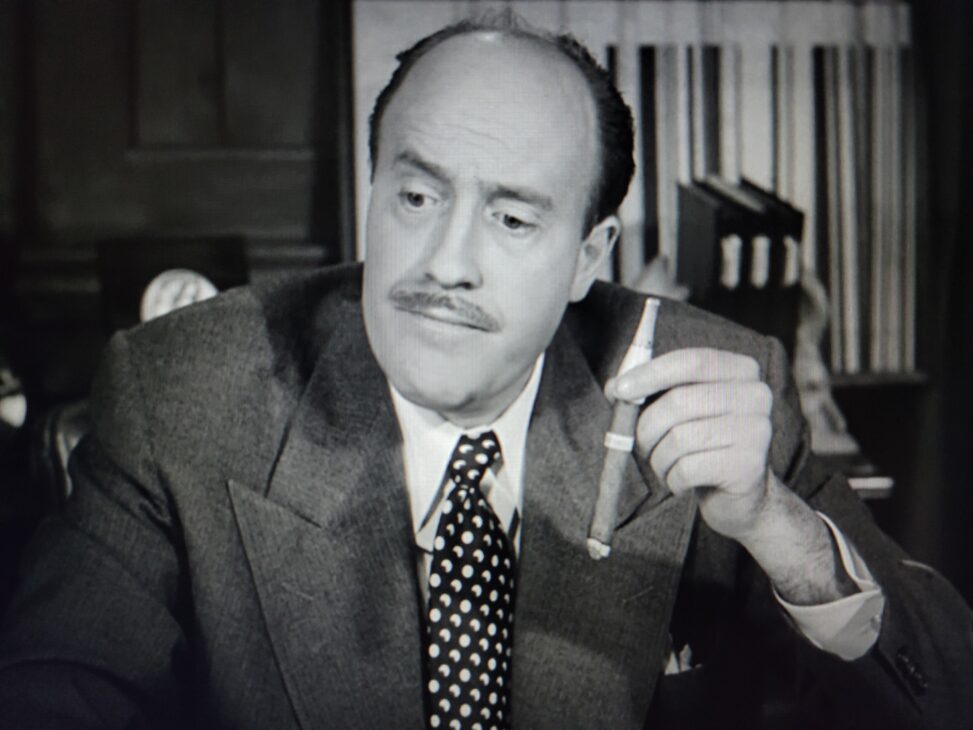In the 1950 film Sunset Boulevard, the minor role of a big-shot Paramount producer, Sheldrake, rejects protagonist Joe Gillis’ prospective film script, leaving him to desperately accept a job from fallen movie star Norma Desmond. After the foreshadowing of his murder, Joe Gillis narrates the events leading up to his death, primarily his abnormal professional/intimate relationship with the deluded Norma Desmond and her despairing attempt to transcend back into cinema after losing relevance in the dying silent film industry. Sheldrake is first introduced after Joe is presented as broke and on the verge of losing his car. Needing money to keep his car, the screenwriter decides to pitch a previously rejected film idea to Sheldrake as a last-ditch attempt, stating that he “always liked [him and] the time had come to take advantage of it” (Sunset Boulevard 5:13-5:17). Joe’s desperation can be analyzed from this statement: he has not had luck in the past but wants to take advantage of Sheldrake’s personal opinion of him. Sheldrake first appears in his office when Joe meets with him where he is seen nonchalantly lounging in his chair smoking a cigar. While Sheldrake is friendly towards Joe, he tells him to pitch to him quickly, establishing the professional setting of their interaction. In the “Small Parts, Small Players” dossier, Will Straw states that the key function of an extra or bit player is to react, and “in reacting, extras’ faces provide the medium through which emotional responses ripple…[giving] a more social sense of film as offering images of collectively shared affect” (Staw 125). Talking to other characters, averting his gaze, and even burping while Joe is speaking, Sheldrake’s indifference solidifies Joe’s desperation, especially considering Joe went into their discussion with confidence. Sheldrake also represents the “everydayness” (79) Straw outlines: he is a character with his own motivations and priorities. Even though Joe narrates to the audience that Sheldrake likes him, he rejects Joe’s script because he knows it is not a viable option for him. When Joe asks him if he can lend him the money he needs, Sheldrake puts a hand on his back, explaining his own economic situation while escorting him out of his office. This scene reinstates how even minor characters have complex and intricate lives outside the narrative of the film; Joe is not the only one who is struggling in the film industry. By analyzing Sheldrake in this scene, the audience can feel the strengthening of Joe’s desperation which subsequently leads to him accepting Norma’s job offer even though he is uncomfortable. The minor role of Sheldrake acts as a vehicle to progress the story line: it was Sheldrake’s rejection that catalyzes Joe’s actions in the film.
Works Cited
Straw, Will. “The Small Parts, Small Players Dossier: Introduction.” Screen, vol. 52, issue 1, 1 March 2011, pp. 78-81, https://doi.org/10.1093/screen/hjq057.
Straw, Will. “Scales of Presence: Bess Flowers and the Hollywood Extra.” Screen, vol. 52, issue 1, 1 March 2011, pp. 121-127, https://doi.org/10.1093/screen/hjq061.
Sunset Boulevard. Directed by Billy Wilder, Performances by William Holden, Gloria Swanson, Eric Von Stroheim, and Nancy Olson, Paramount, 1950. YouTube, https://www.youtube.com/watch?v=fRObt8mE3kY&t=4513s.

Provide Feedback